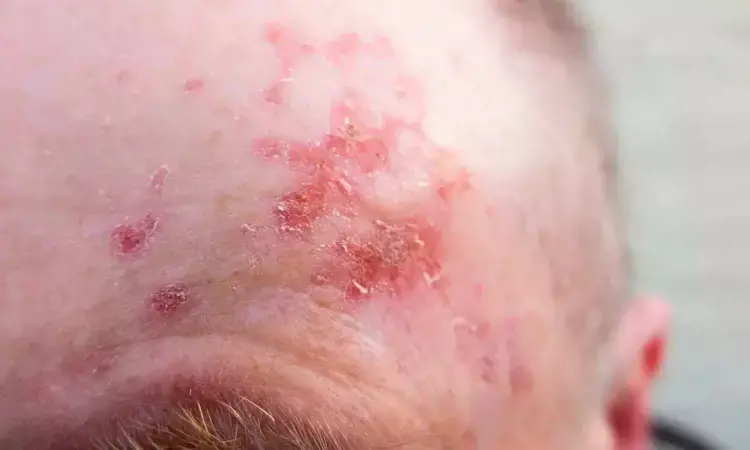- Home
- Medical news & Guidelines
- Anesthesiology
- Cardiology and CTVS
- Critical Care
- Dentistry
- Dermatology
- Diabetes and Endocrinology
- ENT
- Gastroenterology
- Medicine
- Nephrology
- Neurology
- Obstretics-Gynaecology
- Oncology
- Ophthalmology
- Orthopaedics
- Pediatrics-Neonatology
- Psychiatry
- Pulmonology
- Radiology
- Surgery
- Urology
- Laboratory Medicine
- Diet
- Nursing
- Paramedical
- Physiotherapy
- Health news
- Fact Check
- Bone Health Fact Check
- Brain Health Fact Check
- Cancer Related Fact Check
- Child Care Fact Check
- Dental and oral health fact check
- Diabetes and metabolic health fact check
- Diet and Nutrition Fact Check
- Eye and ENT Care Fact Check
- Fitness fact check
- Gut health fact check
- Heart health fact check
- Kidney health fact check
- Medical education fact check
- Men's health fact check
- Respiratory fact check
- Skin and hair care fact check
- Vaccine and Immunization fact check
- Women's health fact check
- AYUSH
- State News
- Andaman and Nicobar Islands
- Andhra Pradesh
- Arunachal Pradesh
- Assam
- Bihar
- Chandigarh
- Chattisgarh
- Dadra and Nagar Haveli
- Daman and Diu
- Delhi
- Goa
- Gujarat
- Haryana
- Himachal Pradesh
- Jammu & Kashmir
- Jharkhand
- Karnataka
- Kerala
- Ladakh
- Lakshadweep
- Madhya Pradesh
- Maharashtra
- Manipur
- Meghalaya
- Mizoram
- Nagaland
- Odisha
- Puducherry
- Punjab
- Rajasthan
- Sikkim
- Tamil Nadu
- Telangana
- Tripura
- Uttar Pradesh
- Uttrakhand
- West Bengal
- Medical Education
- Industry
Vitamin B3 Doesn't Cut Skin Cancer Risk After Organ Transplantation

Vitamin B3 Doesn't Cut Skin Cancer Risk After Organ Transplant suggests a new study published in the New England Journal of Medicine
Immunosuppressed organ-transplant recipients have an increased incidence of, and mortality from, skin cancer. Nicotinamide (vitamin B3) enhances the repair of ultraviolet (UV) radiation–induced DNA damage, reduces the cutaneous immunosuppressive effects of UV radiation, and reduces the incidence of keratinocyte cancers (including squamous-cell and basal-cell carcinomas) and actinic keratoses among high-risk immunocompetent patients. Whether oral nicotinamide is useful for skin-cancer chemoprevention in organ-transplant recipients is unclear.
In this phase 3 trial, they randomly assigned, in a 1:1 ratio, organ-transplant recipients who had had at least two keratinocyte cancers in the past 5 years to receive 500 mg of nicotinamide or placebo twice daily for 12 months. Participants were examined for skin lesions by dermatologists at 3-month intervals for 12 months. The primary end point was the number of new keratinocyte cancers during the 12-month intervention period. Secondary end points included the numbers of squamous-cell and basal-cell carcinomas during the 12-month intervention period, the number of actinic keratoses until 6 months after randomization, safety, and quality of life.
RESULTS
A total of 158 participants were enrolled, with 79 assigned to the nicotinamide group and 79 to the placebo group. The trial was stopped early owing to poor recruitment. At 12 months, there were 207 new keratinocyte cancers in the nicotinamide group and 210 in the placebo group No significant between-group differences in squamous-cell and basal-cell carcinoma counts, actinic keratosis counts, or quality-of-life scores were observed. Adverse events and changes in blood or urine laboratory variables were similar in the two groups.
In this 12-month, placebo-controlled trial, oral nicotinamide therapy did not lead to lower numbers of keratinocyte cancers or actinic keratoses in immunosuppressed solid-organ transplant recipients
Reference:
Allen NC, et al "Nicotinamide for skin-cancer chemoprevention in transplant recipients" N Engl J Med 2023; DOI: 10.1056/NEJMoa2203086.
Dr. Shravani Dali has completed her BDS from Pravara institute of medical sciences, loni. Following which she extensively worked in the healthcare sector for 2+ years. She has been actively involved in writing blogs in field of health and wellness. Currently she is pursuing her Masters of public health-health administration from Tata institute of social sciences. She can be contacted at editorial@medicaldialogues.in.
Dr Kamal Kant Kohli-MBBS, DTCD- a chest specialist with more than 30 years of practice and a flair for writing clinical articles, Dr Kamal Kant Kohli joined Medical Dialogues as a Chief Editor of Medical News. Besides writing articles, as an editor, he proofreads and verifies all the medical content published on Medical Dialogues including those coming from journals, studies,medical conferences,guidelines etc. Email: drkohli@medicaldialogues.in. Contact no. 011-43720751


